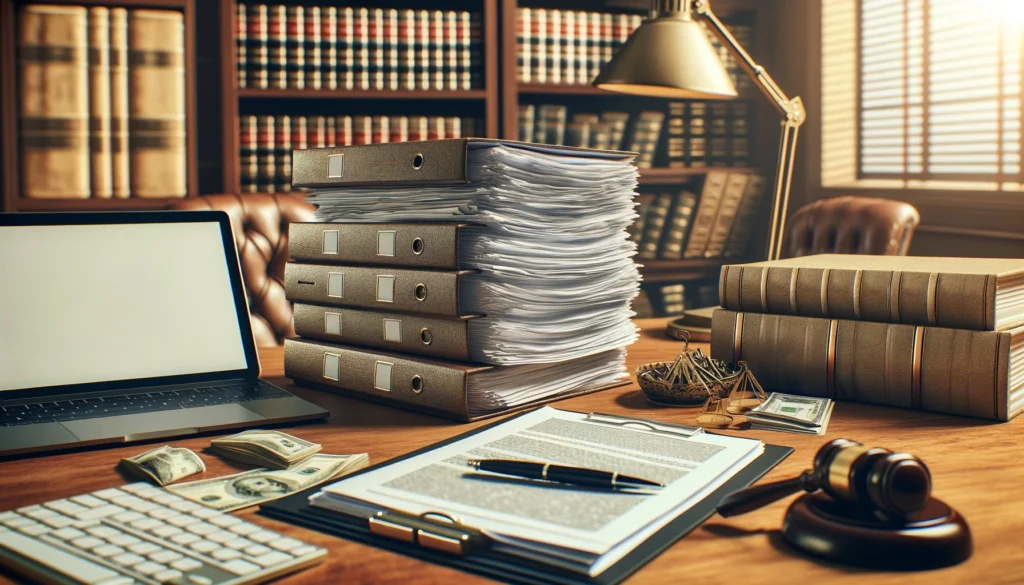
Unlocking New Potential: A Brief Overview of ChatGPT in Legal Work
The legal industry, long revered for its reliance on traditional methodologies, is experiencing a paradigm shift with the introduction of ChatGPT, an advanced AI language model developed by OpenAI. This revolution in technology is particularly notable in the field of personal injury claims, where efficiency and precision are paramount. Leveraging AI such as ChatGPT can significantly enhance the review and adjustment process, offering attorneys a formidable tool to streamline tasks and enhance productivity. In this rapidly evolving landscape, understanding how to effectively utilize such technologies is crucial for remaining competitive and providing clients with exemplary service.
Streamlining Document Review with Precision
The initial review of medical records in personal injury cases can be a daunting and time-consuming process. However, with ChatGPT, this task can be significantly streamlined. By harnessing the power of AI, legal teams can deploy prompts designed to extract key information swiftly and accurately.
- Identifying Key Information: Using prompts such as “Summarize the client’s medical history related to the accident” or “Highlight significant injuries and treatments” allows ChatGPT to pinpoint essential details, reducing the time spent sifting through documents.
- Extracting Case Details: Prompts like “List the dates and types of medical treatments received” or “Identify any discrepancies in the medical records” enable rapid extraction of critical data, facilitating quicker case assessments.
This efficient extraction process not only saves valuable time but also ensures that no crucial detail is overlooked, setting the stage for a thorough and precise claim review.
Also read:
Crafting Comprehensive Demand Letters: Beyond the Basics
Demand letters are the cornerstone of personal injury claims, and their effectiveness can greatly influence settlement outcomes. ChatGPT offers innovative ways to enhance the drafting process, ensuring that these documents are both comprehensive and persuasive.
- Detailed Drafting: Prompts such as “Draft a detailed demand letter for a client who suffered a broken leg and missed 3 months of work, including medical expenses and lost wages” generate complete draft letters that cover all aspects of the claim.
- Ensuring Inclusion of Necessary Elements: By asking ChatGPT to “Include legal arguments, citations, and a thorough summary of the accident and injury” in the demand letter, attorneys can ensure that all critical elements are addressed, enhancing the document’s persuasive power.
These advanced prompt techniques ensure that demand letters are meticulously crafted, thereby increasing the likelihood of favorable settlements.
Also read:
Advanced Data Analysis: Spotting Trends and Patterns
Understanding trends in past claims and settlement patterns is invaluable in personal injury law. ChatGPT can be a potent tool for advanced data analysis, helping to identify these trends with ease.
- Analyzing Claims Data: Prompts like “Analyze the past 100 personal injury claims and identify common injury patterns and settlement amounts” can reveal insightful patterns that may otherwise go unnoticed.
- Spotting Settlement Trends: By requesting ChatGPT to “Compare settlement amounts based on injury severity and client demographics,” attorneys can gain a deeper understanding of what influences settlement sizes, aiding in more accurate case evaluations.
These insights empower legal professionals to make data-driven strategies and informed decisions, ultimately improving client outcomes.
Also read:
Enhancing Communication: Email and Correspondence Templates
Efficient and clear communication with clients and insurance adjusters is essential. ChatGPT can assist in generating customized email templates, ensuring that communications are both professional and effective.
- Customized Templates: Prompts such as “Create an email update for a client about the status of their personal injury claim” or “Draft a follow-up email to an insurance adjuster requesting additional information” can produce well-crafted templates that save time while maintaining professionalism.
- Streamlined Communication: Regularly using ChatGPT-generated prompts like “Summarize the latest communication regarding the claim” ensures that all parties remain informed and engaged, enhancing the overall case management process.
These templates not only improve communication efficiency but also ensure consistent and clear messaging, crucial for successful case resolution.
Also read:
Efficiency in Legal Research: Quick and Accurate
The demands of legal research require both thoroughness and speed, qualities that ChatGPT can enhance significantly. By rapidly providing relevant legal information, ChatGPT supports more efficient case preparation.
- Rapid Legal Research: Prompts such as “Summarize the relevant case law for a slip-and-fall injury claim in New York” can quickly yield useful summaries, saving hours of manual research.
- Accurate Information Retrieval: Asking ChatGPT to “Identify statutes and precedents pertinent to a car accident injury claim” ensures that only the most relevant information is considered, streamlining the legal research process.
This quick and accurate research capability enables attorneys to dedicate more time to strategy and less to information retrieval, improving overall efficiency and effectiveness.
Also read:
Time Management: Calendar and Task Automation
Effective time management is crucial in legal practice, and ChatGPT can assist by automating scheduling and task reminders.
- Scheduling and Reminders: Prompts like “Set a reminder for the filing deadline of a lawsuit” or “Create a calendar event for a client meeting” help ensure that important dates and tasks are never overlooked.
- Task Automation: Using ChatGPT to “Generate a weekly schedule including all key deadlines and tasks” aids in maintaining a structured and manageable workflow.
This automation not only reduces the risk of missed deadlines but also enhances overall time management, allowing legal professionals to focus on higher-priority tasks.
Also read:
Mitigating Common Pitfalls: Error Detection & Quality Control
Ensuring accuracy and consistency in legal documents is paramount. ChatGPT can be instrumental in detecting errors and maintaining quality control.
- Error Detection: Prompts like “Check this document for inconsistencies and errors” help identify potential issues early, allowing for timely corrections.
- Quality Assurance: Asking ChatGPT to “Review the document for legal accuracy and completeness” ensures that all communications and documents meet the highest standards of quality.
By mitigating common pitfalls, ChatGPT helps maintain a high standard of professionalism and accuracy in legal work.
Also read:
Confidentiality and Ethical Considerations
While utilizing AI tools, safeguarding sensitive information remains a critical concern. Ensuring confidentiality and ethical use of technology is paramount.
- Safeguarding Information: Using prompts such as “Ensure no confidential client information is included in this email draft” helps protect sensitive data.
- Ethical AI Use: Maintaining ethical standards by requesting, “Adhere to professional ethical guidelines when generating legal documents” ensures compliance with industry norms and standards.
Adhering to these considerations ensures that the use of AI enhances rather than compromises the integrity of legal practice.
Conclusion: Embracing Technology for a Smarter Workflow
Embracing AI, particularly ChatGPT, can significantly enhance the workflow within personal injury claim reviews and adjustments. From streamlining document review and crafting comprehensive demand letters to advanced data analysis and enhanced communication, the benefits are manifold. As legal professionals, integrating these tools intelligently within our practice can lead to more efficient and effective outcomes, ensuring we remain at the forefront of the evolving legal landscape.


